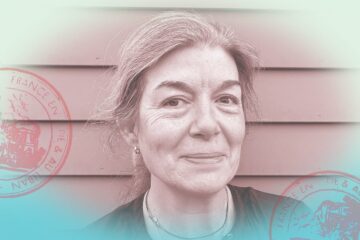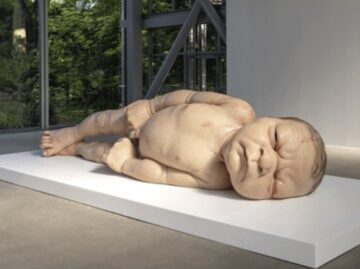Steven Shaviro in his own blog:
 Bérubé’s new book, The Ex-Human, is about science fiction. Bérubé offers thoughtful close readings of a number of classic science fiction texts: Ursula Le Guin’s The Left Hand of Darkness, Cixin Liu’s The Three-Body Problem, Margaret Atwood’s Oryx and Crake, Philip K. Dick’s Do Androids Dream of Electric Sleep? (with some reference to its film adaptation as Blade Runner), Arthur C. Clarke’s 2001 (with some reference to its better-known film adaptation by Stanley Kubrick), and Octavia Butler’s Parable series and Lilith’s Brood series.
Bérubé’s new book, The Ex-Human, is about science fiction. Bérubé offers thoughtful close readings of a number of classic science fiction texts: Ursula Le Guin’s The Left Hand of Darkness, Cixin Liu’s The Three-Body Problem, Margaret Atwood’s Oryx and Crake, Philip K. Dick’s Do Androids Dream of Electric Sleep? (with some reference to its film adaptation as Blade Runner), Arthur C. Clarke’s 2001 (with some reference to its better-known film adaptation by Stanley Kubrick), and Octavia Butler’s Parable series and Lilith’s Brood series.
Bérubé’s discussions of all these texts are subtle and insightful. But close reading in its own right is not the point of the book. Bérubé includes autobiographical personal reflections, and discusses writing the book in the wake of the COVID-19 pandemic, which deeply changed the dynamics of his own personal and family life, together with everyone else’s. Above all, though, the book is concerned with how science fiction allows us to entertain non-human perspectives upon human life and existence, and specifically to imagine the end of humanity — or rather (and better) its transformation in radical ways that exceed our capacity for imaginative projection and continued empathy.
More here.

 “I’m a writer; I tell stories,” reads the first line of Claire Messud’s
“I’m a writer; I tell stories,” reads the first line of Claire Messud’s  Older people who aren’t picky eaters appear to have better brain health than those who prefer more limited diets, according to a large study of British adults. The
Older people who aren’t picky eaters appear to have better brain health than those who prefer more limited diets, according to a large study of British adults. The  I’m stressed and running late, because what do you wear for the rest of eternity?
I’m stressed and running late, because what do you wear for the rest of eternity? Proteins are biological workhorses. They build our bodies and orchestrate the molecular processes in cells that keep them healthy. They also present a wealth of targets for new medications. From everyday pain relievers to sophisticated cancer immunotherapies, most current drugs interact with a protein. Deciphering protein architectures could lead to new treatments. That was the promise of AlphaFold 2, an AI model from Google DeepMind that predicted how proteins gain their distinctive shapes based on the sequences of their constituent molecules alone. Released in 2020, the tool was a breakthrough half a decade in the making. But proteins don’t work alone. They inhabit an entire cellular universe and often collaborate with other molecular inhabitants like, for example, DNA, the body’s genetic blueprint.
Proteins are biological workhorses. They build our bodies and orchestrate the molecular processes in cells that keep them healthy. They also present a wealth of targets for new medications. From everyday pain relievers to sophisticated cancer immunotherapies, most current drugs interact with a protein. Deciphering protein architectures could lead to new treatments. That was the promise of AlphaFold 2, an AI model from Google DeepMind that predicted how proteins gain their distinctive shapes based on the sequences of their constituent molecules alone. Released in 2020, the tool was a breakthrough half a decade in the making. But proteins don’t work alone. They inhabit an entire cellular universe and often collaborate with other molecular inhabitants like, for example, DNA, the body’s genetic blueprint. As radical as they might seem, calls for limits on wealth are as old as civilization itself. The Hebrew Bible and Torah recognized years during which debts should be cancelled, slaves set free and property redistributed from rich to poor. In classical Greece, Aristotle praised cities that kept wealth inequality in check to enhance political stability. And in 1942, then-US president Franklin D. Roosevelt argued that annual incomes should be capped at the current equivalent of US$480,000.
As radical as they might seem, calls for limits on wealth are as old as civilization itself. The Hebrew Bible and Torah recognized years during which debts should be cancelled, slaves set free and property redistributed from rich to poor. In classical Greece, Aristotle praised cities that kept wealth inequality in check to enhance political stability. And in 1942, then-US president Franklin D. Roosevelt argued that annual incomes should be capped at the current equivalent of US$480,000. Mr. Simons equipped his colleagues with advanced computers to process torrents of data filtered through mathematical models, and turned the four investment funds in his new firm,
Mr. Simons equipped his colleagues with advanced computers to process torrents of data filtered through mathematical models, and turned the four investment funds in his new firm, 
 Editor-in-chief Sarahanne Field describes herself and her team at the Journal of Trial & Error as wanting to highlight the “ugly side of science — the parts of the process that have gone wrong”.
Editor-in-chief Sarahanne Field describes herself and her team at the Journal of Trial & Error as wanting to highlight the “ugly side of science — the parts of the process that have gone wrong”. Richard Pithouse: Mandela was released from prison on February 11, 1990, suddenly opening up the field of political possibility after a long and exhausting stalemate between the progressive forces, which were largely organized in two groups: the United Democratic Front (UDF) and the trade unions, and the apartheid state. What did Mandela’s release mean to you?
Richard Pithouse: Mandela was released from prison on February 11, 1990, suddenly opening up the field of political possibility after a long and exhausting stalemate between the progressive forces, which were largely organized in two groups: the United Democratic Front (UDF) and the trade unions, and the apartheid state. What did Mandela’s release mean to you? In the years following American independence, many questions would be asked, in different spheres, of what it meant to be a citizen, and
In the years following American independence, many questions would be asked, in different spheres, of what it meant to be a citizen, and  Longevity and eternal youth have frequently been sought after down through the ages, and efforts to keep from dying and fight off age have a long and interesting history.
Longevity and eternal youth have frequently been sought after down through the ages, and efforts to keep from dying and fight off age have a long and interesting history.